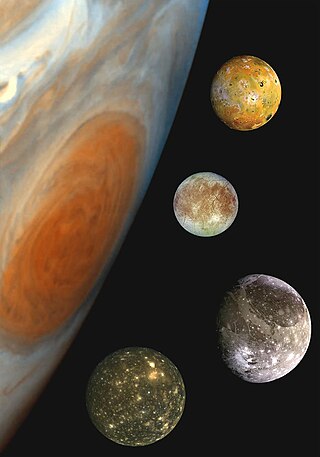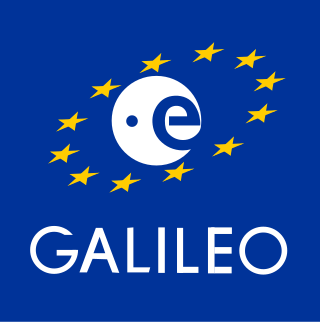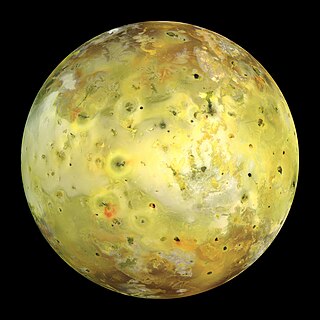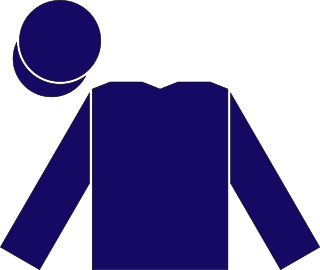
Robert Bellarmine was an Italian Jesuit and a cardinal of the Catholic Church. He was canonized a saint in 1930 and named Doctor of the Church, one of only 37. He was one of the most important figures in the Counter-Reformation.

The Galilean moons, or Galilean satellites, are the four largest moons of Jupiter: Io, Europa, Ganymede, and Callisto. They are the most readily visible Solar System objects after Saturn, the dimmest of the classical planets; though their closeness to bright Jupiter makes naked-eye observation very difficult, they are readily seen with common binoculars, even under night sky conditions of high light pollution. The invention of the telescope enabled the discovery of the moons in 1610. Through this, they became the first Solar System objects discovered since humans have started tracking the classical planets, and the first objects to be found to orbit any planet beyond Earth.

Galileo is a global navigation satellite system (GNSS) created by the European Union through the European Space Agency (ESA) and operated by the European Union Agency for the Space Programme (EUSPA). It is headquartered in Prague, Czechia, with two ground operations centres in Oberpfaffenhofen, Germany, and in Fucino, Italy,. The €10 billion project went live in 2016. It is named after the Italian astronomer Galileo Galilei.
Inertia is the natural tendency of objects in motion to stay in motion and objects at rest to stay at rest, unless a force causes the velocity to change. It is one of the fundamental principles in classical physics, and described by Isaac Newton in his first law of motion. It is one of the primary manifestations of mass, one of the core quantitative properties of physical systems. Newton writes:
LAW I. Every object perseveres in its state of rest, or of uniform motion in a right line, except insofar as it is compelled to change that state by forces impressed thereon.

Life of Galileo, also known as Galileo, is a play by the 20th century German dramatist Bertolt Brecht and collaborator Margarete Steffin with incidental music by Hanns Eisler. The play was written in 1938 and received its first theatrical production at the Zurich Schauspielhaus, opening on the 9th of September 1943. This production was directed by Leonard Steckel, with set-design by Teo Otto. The cast included Steckel himself, Karl Paryla and Wolfgang Langhoff.

Io, or Jupiter I, is the innermost and second-smallest of the four Galilean moons of the planet Jupiter. Slightly larger than Earth's moon, Io is the fourth-largest moon in the Solar System, has the highest density of any moon, the strongest surface gravity of any moon, and the lowest amount of water by atomic ratio of any known astronomical object in the Solar System. It was discovered in 1610 by Galileo Galilei and was named after the mythological character Io, a priestess of Hera who became one of Zeus's lovers.

Galileo Galilei is an opera based on excerpts from the life of Galileo Galilei, which premiered in 2002 at Chicago's Goodman Theatre, as well as subsequent presentations at the Brooklyn Academy of Music's New Wave Music Festival and London's Barbican Theatre. The music is by Philip Glass, with libretto and original direction by Mary Zimmerman and Arnold Weinstein. The piece is presented in one act, consisting of ten scenes without break.

A satellite navigation or satnav system is a system that uses satellites to provide autonomous geopositioning. A satellite navigation system with global coverage is termed global navigation satellite system (GNSS). As of 2024, four global systems are operational: the United States's Global Positioning System (GPS), Russia's Global Navigation Satellite System (GLONASS), China's BeiDou Navigation Satellite System (BDS), and the European Union's Galileo.

Galileo was an Irish Thoroughbred racehorse and sire. In a racing career which lasted from October 2000 until October 2001, he ran eight times and won six races. He is best known for having won the Derby, Irish Derby and King George VI and Queen Elizabeth Stakes in 2001. He was named the European Champion Three-Year-Old Colt of 2001.
Alexandre Koyré, also anglicized as Alexander Koyre, was a French philosopher of Russian origin who wrote on the history and philosophy of science.

The Galileo affair began around 1610, and culminated with the trial and condemnation of Galileo Galilei by the Roman Catholic Inquisition in 1633. Galileo was prosecuted for holding as true the doctrine of heliocentrism, the astronomical model in which the Earth and planets revolve around the Sun at the centre of the universe.

Museo Galileo is located in Florence, Italy, in Piazza dei Giudici, along the River Arno and close to the Uffizi Gallery. The museum, dedicated to astronomer and scientist Galileo Galilei, is housed in Palazzo Castellani, an 11th-century building which was then known as the Castello d'Altafronte.

The relationship between science and the Catholic Church has been both collaborative and contentious throughout history. Historically, the Catholic Church has served as a major patron of the sciences, playing an influential role in the establishment and funding of educational institutions, universities, and hospitals. Many members of the clergy have actively contributed to scientific research. Some historians of science, such as Pierre Duhem, attribute the origins of modern science to medieval Catholic scholars like John Buridan, Nicole Oresme, and Roger Bacon. However, the relationship has not been without conflict. Critics, including proponents of the conflict thesis, point to historical and contemporary tensions between the Church and science, such as the trial of Galileo, as examples of where the Church has opposed scientific findings that challenged its teachings. The Catholic Church, for its part, maintains that science and faith are complementary, as expressed in the Catechism of the Catholic Church, which addresses this relationship.

Galileo di Vincenzo Bonaiuti de' Galilei, commonly referred to as Galileo Galilei or mononymously as Galileo, was a Florentine astronomer, physicist and engineer, sometimes described as a polymath. He was born in the city of Pisa, then part of the Duchy of Florence. Galileo has been called the father of observational astronomy, modern-era classical physics, the scientific method, and modern science.

Clytini is a tribe of beetles in the subfamily Cerambycinae, containing the following genera:
Calliini is a tribe of longhorn beetles of the subfamily Lamiinae.

Colobotheini is a tribe of longhorn beetles of the subfamily Lamiinae.

Desmiphorini is a tribe of longhorn beetles of the subfamily Lamiinae.

Galileo was an American robotic space probe that studied the planet Jupiter and its moons, as well as the asteroids Gaspra and Ida. Named after the Italian astronomer Galileo Galilei, it consisted of an orbiter and an entry probe. It was delivered into Earth orbit on October 18, 1989, by Space ShuttleAtlantis, during STS-34. Galileo arrived at Jupiter on December 7, 1995, after gravitational assist flybys of Venus and Earth, and became the first spacecraft to orbit an outer planet.















